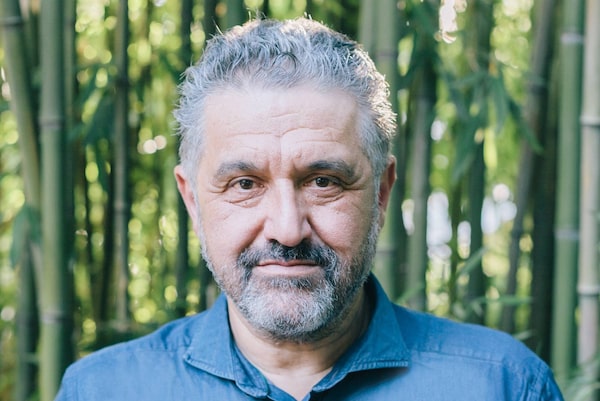
Paul Goldberg.
A ubiquitous American president sets an orange cloud over Paul Goldberg's new novel, The Château. The question: Is it toxic?
In the acknowledgments that follow The Château, Goldberg stops just short of thanking Donald Trump for helping make the book possible. Instead, he coyly observes that Trump provided "the macrocosm for [his] microcosm."
Taking a macro view, Goldberg, a journalist and the author of an acclaimed earlier novel, The Yid, deftly grafts the language and ideas of Trump's presidential campaign, and now the first year of his presidency, onto his second fictional work.
The effect is a reading experience that's unmistakably set in Trump's America, which could make you want to stop reading, but you shouldn't. The Château isn't toxic. You won't choke. In the growing category of Trump novels, which includes Salman Rushdie's The Golden House, this entry will make you laugh. The reason? Goldberg's "microcosm."
The Château, which spans the 15 days before Trump's inauguration, starts with a death and a firing. The dead guy is cosmetic surgeon Dr. Zbignew Wronski, who dies mysteriously, going over the railing of the 43rd-storey balcony of the Grand Dux Hotel in Hollywood, Fla. The next day, his old friend from school, Bill Katzenelenbogen, is fired from the Washington Post for insubordination. Bill, an investigative science reporter, was "one of the best of his generation, a serial finalist for the Pulitzer Prize." His act of insubordination? He was caught on camera by a TV news crew taking a "deep nap" during a municipal board meeting. But Bill's real sin as a reporter was that over the past six years he'd "become a newsroom zombie, one of the typing dead."
While Bill is searching for comfort with a drink in a bar, an ex, Gwen, joins him. Gwen was a star reporter until she was caught fabricating most of her articles. Bill was there in her time of need, encouraging her to write a remorseful memoir creatively titled Remorse. It sold spectacularly. From that success, she ended up with a career in crisis communications.
To return the favour, Gwen encourages Bill to pursue a book project – one about the recently deceased Dr. Wronski – and, in turn, as Goldberg suggests, she becomes Beatrice to Bill's Dante. With no other plan for the rest of his life, Bill goes to Florida in search of the real story behind the death of his friend even though they had allowed "their friendship to dissolve into Facebook displays of communication of useless fact that (extended) the genre of braggy, soulless Christmas letter into a year-long affair."
Ultimately, Zbig's death is Goldberg's method of placing Bill in Florida where he reunites with his 82-year-old Jewish father, Melsor, who lives at the titular Château. The elder Katzenelenbogen is a bit cartoonish, wears a "massive gold chain with a proportionally sized star of David," and has had his poetry most recently published by the "noteworthy Amazon.com." If Melsor hadn't emigrated, he believes he'd be a Russian oligarch these days. Instead, he's embroiled in what becomes the main focus of the novel, a condo-board election against incumbents who have enriched themselves through an illegal contractor kickback scheme.
It's for that reason Bill is willing to help his father even though their relationship is contentious. For one thing, Bill hasn't forgiven his father for escaping prison despite being guilty of Medicaid fraud. And whereas Bill is left-leaning, Melsor is a proud reader of Trump's 1987 book, The Art of the Deal, parts of which he's translated into his native Russian. Melsor believes that Donald Trump – who he calls Donal'd Tramp – is a misunderstood philosopher comparable to Albert Camus. He tells Bill, "If you want to understand me some day, you should read Tramp."
Goldberg does give you the opportunity to read Tramp, er, Trump. Or at least ghostwritten Trump. Quotes from The Art of the Deal serve as epigraphs to each of the book's sections. The novel is nearly 400 pages, but its pacing feels more like cable news. You're always on to the next thing in the plot, which includes everything from wiretapping Melsor's election opponent to the book's characters finding echoes between events in their story and Gogol's The Government Inspector.
Along the way, Goldberg references directly or indirectly all of your favourites: Putin, (fear of) immigration, climate change, Russia, prostitutes, kompromat, Russia, fake news, conspiracy, Russia, health insurance, blackmail, Russia, ISIS, feminism, wiretapping, and on it goes.
Goldberg writes smooth prose even when he drops in Russian words, phrases and poetry, most of which add humour to the novel. If approval ratings dip on the story, the blame falls on the parts that are underdeveloped – the death of Bill's mother – or unnecessary (like Bill's not-quite ex-wife). The aspect most fully developed is Goldberg's humour, which floats in the same space as late-night TV. But whether you like the jokes depends on how you like your satire. Goldberg isn't merciless, but he's not Jimmy Fallon either. Thankfully.
At one point in the novel, a character tells Bill how Trump is internal: "He lives in your closet, he lives in your head, he lives in your soul, and there – in those places – he always lived." That is Trump in The Château, but Goldberg gives you hope with his humour and a mostly happy ending. Then he takes the hope away – the novel ends on inauguration day.
Michael Czobit is a writer and critic.
Michael Redhill has won the $100,000 Scotiabank Giller Prize for his novel 'Bellevue Square,' about a woman on the hunt for her doppelganger. The Toronto author says it would have been foolish to imagine he could win the award.
The Canadian Press